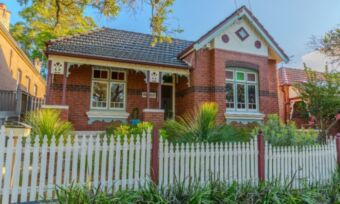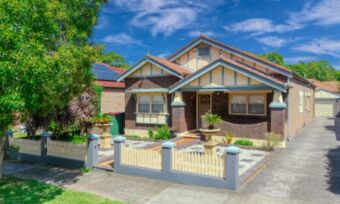How much does it cost to sell a house in Australia?
Understanding some of the possible costs involved when it comes to selling your property can help you to set a suitable budget early and avoid unwanted surprises.

Understanding some of the possible costs involved when it comes to selling your property can help you to set a suitable budget early and avoid unwanted surprises.
Key points:
- Real estate agent commissions in Australia tend to be between 2% to 3%.
- The average Aussie tends to borrow around $22,640 for a home renovation job.
- Conveyancing and mortgage discharge fees can add up to more than $3,000.
What costs can you face when it comes time to sell your house?
There are various costs that come with selling your house, from larger considerations through to real estate and conveyancing through to smaller ones like fixing that leaky tap in the back yard. Common costs include:
- Pre-market repairs and renovations
- Marketing your home
- Real estate agent fees
- Styling and staging costs
- Conveyancing costs
- Lender fees
- Taxes
Some of these costs, like conveyancing, are likely to be unavoidable, while others are dependent on your decisions, such as home repairs and marketing campaigns.
Pre-market repairs and renovations: $100 – $25,000+
Getting your property ship shape for sale could mean tackling minor repairs and touch-ups, like a fresh coat of paint or a replacement pailing on a fence. These could cost a few hundred dollars to accomplish, but a renovation could run into the thousands.
According to a study from digital lender MONEYME, the average Aussie tends to borrow around $22,640 for home renovation jobs. This amount could therefore serve as a benchmark for what you might expect to pay if you want to undertake major work like a kitchen renovation.
Marketing a home for sale: $3,750 – $12,500
Once your property is ready to sell, you’ll want to get the word out to as many potential buyers as possible. A professional marketing campaign can include anything from professional photography and drone footage of the property, through to advertising campaigns online and in print, and flyers and signage.
According to Open Agent, a comprehensive marketing campaign for property in the $750,000 price range may cost $3,750 to $7,500 to market. A property in the $1,500,000 range may cost $7,500 to $12,500. Before committing to an expensive marketing campaign, though, it’s worth asking whether you’ll reap the rewards when it’s time to sell.
Real estate agent fees: 2% to 3%
It can be difficult to gauge the exact cost of the average real estate commission, as it can vary from suburb to suburb and agent to agent. You might also expect that, the more high end or exclusive your property is, the higher commission rate you might pay. In general terms, you might expect the average real estate agent in Australia to charge between 2% to 3% of the sale price.
Based on recent figures from Open Agent, Tasmania tends to have the highest average real estate commission fees in Australia, at 2.96%, while South Australia has the lowest, at 1.99%. It’s also worth asking your real estate agent if they charge any fees in addition to their commission.
The comparison rate for all home loans and loans secured against real property are based on secured credit of $150,000 and a term of 25 years.
^WARNING: This comparison rate is true only for the examples given and may not include all fees and charges. Different terms, fees or other loan amounts might result in a different comparison rate.

Up to $3,000 when you take out a IMB home loan. Minimum loan amounts and LVR restrictions apply. Offer available until further notice. See provider website for full details. Exclusions, terms and conditions apply.
 Owner occupied
Owner occupied
 20% min deposit
20% min deposit
 Redraw facility
Redraw facility
 Owner occupied
Owner occupied
 20% min deposit
20% min deposit
 Redraw facility
Redraw facility
Canstar may earn a fee for referrals from its website tables, and from Sponsorship or Promotion of certain products. Fees payable by product providers for referrals and Sponsorship or Promotion may vary between providers, website position, and revenue model. Sponsorship or Promotion fees may be higher than referral fees. Sponsored or Promoted products are clearly disclosed as such on website pages. They may appear in a number of areas of the website such as in comparison tables, on hub pages and in articles. Sponsored or Promoted products may be displayed in a fixed position in a table, regardless of the product’s rating, price or other attributes. The table position of a Sponsored or Promoted product does not indicate any ranking or rating by Canstar. For more information please see How We Get Paid.
Conveyancing fees: $800 – $2,200
Conveyancing is the legal process by which the title of a house transfers from the seller to the new owner. It is a complex process with a number of potential issues that can arise, and it’s therefore advisable to have a professional help you through the princess. Throughout most of Australia, conveyancing can be done by a conveyancer or solicitor, but in the ACT and Queensland, it can only be done by a solicitor.
According to The Mortgage Agency, conveyancing costs vary based on local regulations and the location of the property, but as a guide, they say that conveyancing in major cities can cost between $1,000 and $2,200, and in rural areas, can cost between $800 to $1,800.
Mortgage discharge and lender fees: $150 – $1,000
If you are ending your contract with your home loan lender, you may well encounter certain fees and charges.Depending on your home loan lender, you may well be required to pay what’s known as a discharge, termination or settlement fee to cover the costs of administration.
Some lenders may charge ‘break fees’. These are more common on longer fixed-term loans where the borrower has committed to making a certain amount in repayments over time. For example, if interest rates have fallen since a home loan commenced, a lender may try to retain the fees it would have earned, had the fixed term run to its completion.
While the potential range of fees is broad, Westpac estimates that you could pay anywhere from $150 to $1,000.
Capital gains tax: Speak to your accountant
When you sell certain types of property, including real estate, the difference between how much you paid for it and how much you sold it for is known as capital gains, and this can have tax implications for you. According to the Australian Tax Office (ATO), if you sell an investment property and make a profit, that profit must be declared by you on your tax return. The tax you pay on a capital gain is known as capital gains tax (GCT).
There are some exemptions to CGT, but in broad terms, it’s advisable to speak with a qualified tax professional to determine the tax implications of selling your house, and whether you will be required to pay CGT.
Cover image source: Studio Romantic/Shutterstock.com
This article was reviewed by our Editor-in-Chief Nina Rinella before it was updated, as part of our fact-checking process.

Alasdair Duncan is Canstar's Deputy Finance Editor, specialising in home loans, property and lifestyle topics. He has written more than 500 articles for Canstar and his work is widely referenced by other publishers and media outlets, including Yahoo Finance, The New Daily, The Motley Fool and Sky News. He has featured as a guest author for property website homely.com.au.
In his more than 15 years working in the media, Alasdair has written for a broad range of publications. Before joining Canstar, he was a News Editor at Pedestrian.TV, part of Australia’s leading youth media group. His work has also appeared on ABC News, Junkee, Rolling Stone, Kotaku, the Sydney Star Observer and The Brag. He has a Bachelor of Laws (Honours) and a Bachelor of Arts with a major in Journalism from the University of Queensland.
When he is not writing about finance for Canstar, Alasdair can probably be found at the beach with his two dogs or listening to podcasts about pop music. You can follow Alasdair on LinkedIn.
- What costs can you face when it comes time to sell your house?
- Pre-market repairs and renovations: $100 – $25,000+
- Marketing a home for sale: $3,750 – $12,500
- Real estate agent fees: 2% to 3%
- Conveyancing fees: $800 – $2,200
- Mortgage discharge and lender fees: $150 – $1,000
- Capital gains tax: Speak to your accountant
The comparison rate for all home loans and loans secured against real property are based on secured credit of $150,000 and a term of 25 years.
^WARNING: This comparison rate is true only for the examples given and may not include all fees and charges. Different terms, fees or other loan amounts might result in a different comparison rate.
 Owner occupied
Owner occupied
 50% min deposit
50% min deposit
 Redraw facility
Redraw facility
Try our Home Loans comparison tool to instantly compare Canstar expert rated options.
The comparison rate for all home loans and loans secured against real property are based on secured credit of $150,000 and a term of 25 years.
^WARNING: This comparison rate is true only for the examples given and may not include all fees and charges. Different terms, fees or other loan amounts might result in a different comparison rate.





